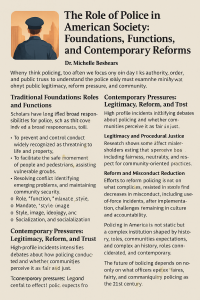The Role of Police in American Society: Foundations, Functions, and Contemporary Reforms
 The Role of Police in American Society: Foundations, Functions, and Contemporary Reforms
The Role of Police in American Society: Foundations, Functions, and Contemporary Reforms
By Dr. Michelle Beshears
When we think of policing, we often focus too narrowly on daily tasks such as patrols, arrests, and traffic stops. Policing is deeply tied to how society defines authority, order, and public trust. To fully understand the police role, we must examine not only what officers do, but also how public legitimacy, reform pressure, and community expectations shape their mission.
Traditional Foundations: Roles and Functions
Scholars have long identified broad responsibilities for police. These include preventing threats to life and property, protecting individuals from harm, facilitating the safe movement of vehicles and pedestrians, assisting vulnerable groups, resolving conflicts, identifying emerging problems before escalation, and maintaining community security. These functions demonstrate that policing is not limited to crime suppression, but also encompasses service, prevention, and problem-solving (Tyler, 2025).
In sociological terms:
-
A role is what society expects from police, such as using force or gathering information.
-
A function describes what police do to maintain social stability, whether intended or unintended.
-
A mandate merges legal duties with a vision for future policing.
-
Style, image, ideology, and socialization influence how officers behave under stress, how they present themselves, how narratives are constructed, and how they absorb police culture over time (Cassino & Demir, 2024).
Contemporary Pressures: Legitimacy, Reform, and Trust
High-profile incidents have intensified debates about how policing is conducted and whether communities perceive it as fair and just.
Legitimacy and Procedural Justice
Legitimacy is central to effective policing. Research shows that compliance with police directives is tied to perceptions of fairness, neutrality, and respect during interactions (Tyler, 2025). Similarly, studies indicate that officers’ sense of self-legitimacy, their belief in their own authority and fairness, is associated with more substantial support for community-oriented practices (Meško, 2025). This suggests legitimacy operates on both sides of the badge, shaping how officers and communities engage with each other.
Reform and Misconduct Reduction
Efforts to reform policing are widespread, but their effectiveness is a topic of debate. For example, one study of reform legislation found that misconduct, including use-of-force incidents, decreased after implementation; however, challenges in culture and accountability persisted (Cassino & Demir, 2024). This reinforces the idea that reform must extend beyond policy change to address organizational culture and accountability systems.
Technology, Bias, and Policing
Modern policing also faces challenges brought by technology. Body-worn cameras, predictive algorithms, and machine learning tools now influence how encounters are recorded and analyzed. A recent study showed how different stakeholders frame algorithmic bias in predictive policing differently, reflecting competing ideas of fairness and risk (Ziosi & Pruss, 2024). While these tools can promote transparency, they also introduce ethical dilemmas about surveillance and equity.
Conclusion
Policing in America is not a static institution, but a complex one shaped by history, roles, community expectations, and ongoing reform. Its traditional functions, including order maintenance, safety, service, and enforcement, provide the foundation. Yet legitimacy, reform, and technology are reshaping what policing must become in the 21st century.
The future of policing depends not only on what officers do but also on whether communities believe they act reasonably and with accountability. The balance between authority and service, enforcement and legitimacy, will continue to define the path of American policing.
References
Cassino, P. P., & Demir, M. (2024). The effect of police reform on overall police misconduct and misconduct that involves the use of force. Journal of Criminal Justice, 91, 102263. https://doi.org/10.1016/j.jcrimjus.2024.102263
Meško, G. (2025). Police officers’ self-legitimacy and support for community policing. Policing: An International Journal of Police Strategies & Management. https://www.tandfonline.com/doi/full/10.1080/15614263.2025.2507119
Tyler, T. R. (2025). Legitimacy-based policing. Policing and Society. https://onlinelibrary.wiley.com/doi/10.1111/1745-9133.12695
Ziosi, M., & Pruss, D. (2024). Evidence of what, for whom? The socially contested role of algorithmic bias in a predictive policing tool. arXiv. https://arxiv.org/abs/2405.07715
About the Author
Dr. Michelle L. Beshears holds undergraduate degrees in social psychology and criminal justice, as well as graduate degrees in human resource development and criminology, from Indiana State University. She served 11 years in the U.S. Army, achieving the rank of Staff Sergeant before commissioning as an officer. Dr. Beshears has led multiple criminal investigations and collaborated with federal and local agencies, including the FBI. She is pursuing a Doctorate in Criminal Justice and serves as an associate professor at American Military University & American Public University. She lives in Clarkridge, Arkansas, with her husband and two children.

